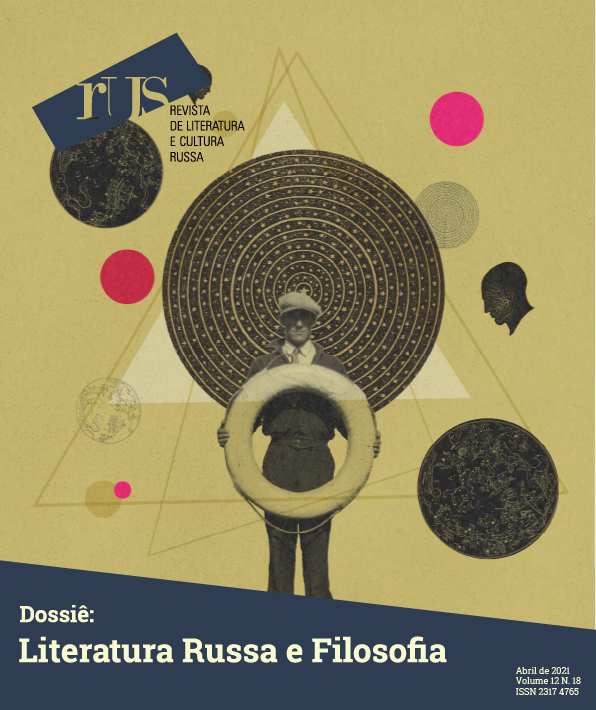Rodion Raskólnikov ou Do pretenso direito ao crime: Apontamentos / itinerário para uma leitura de Crime e Castigo
DOI:
https://doi.org/10.11606/issn.2317-4765.rus.2021.181792Palavras-chave:
Crime e castigo, Modernidade, RevoltaResumo
O texto procura alinhavar o roteiro de uma leitura de Crime e Castigo, de Fiódor Dostoiévski. Raskólnikov marca o tipo moderno (cartesiano, iluminista), a saber, l’homme révolté. Revoltado contra a própria vida, a própria existência. Isso por mostrar-se esta como pouca, pobre, finita. Este é o fundo metafísico que, do ponto de vista moral-religioso ou teológico-cristão, define a noção de culpa. Esta compreensão (a saber, revolta, ingratidão) perfaz não só “Crime e Castigo”, mas todas as grandes obras de Dostoiévski.
Downloads
Referências
DOSTOIEVSKI, Fiódor. Crime e Castigo, em Obra Completa, Companhia Aguilar Editora, Rio de Janeiro, 1963, Vol. II.
GASSET, José Ortega y. En Torno a Galileo, Lección IX, Revista de Occidente, Madri, 1956, p. 167/8.
Publicado
Versões
- 2021-06-16 (4)
- 2021-06-16 (3)
- 2021-06-16 (2)
- 2021-04-29 (1)
Edição
Seção
Licença
Copyright (c) 2021 Gilvan Fogel

Este trabalho está licenciado sob uma licença Creative Commons Attribution-NonCommercial-ShareAlike 4.0 International License.
Os autores que publicam na RUS concordam com os seguintes termos:
a. Os autores mantém os direitos autorais e concedem à revista o direito de primeira publicação, com o trabalho simultaneamente licenciado sob a Licença Creative Commons Atribuição 4.0 Internacional (CC BY-NC-SA) que permite o compartilhamento do trabalho com reconhecimento da autoria e publicação inicial nesta revista.
b. Os autores têm autorização para assumir contratos adicionais separadamente, para distribuição não-exclusiva da versão do trabalho publicada nesta revista (ex.: publicar em repositório institucional ou como capítulo de livro), com reconhecimento de autoria e publicação inicial nesta revista.
c. Os autores têm permissão e são estimulados a publicar e distribuir seu trabalho online (ex.: em repositórios institucionais ou na sua página pessoal) a qualquer ponto antes ou durante o processo editorial, já que isso pode gerar alterações produtivas, bem como aumentar o impacto e a citação do trabalho publicado (Veja O Efeito do Acesso Livre).





